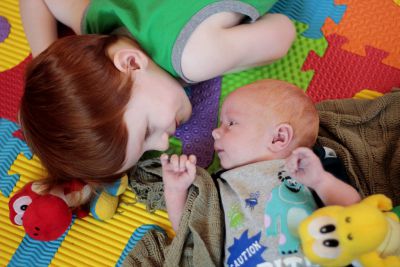Infants begin to develop trust when parents begin to fulfil their needs. Such as changing an infant's nappy when needed, feeding on request and holding them when they cry. Infants cry to express anger, pain and hunger. It is their way of communicating with the world around them.
Social and Emotional Development Milestones
From 0 to 4 months
During the first few months, infants learn to identify and respond to their own needs and feelings, developing trust and creating a bond with parents and their new family. Infant's social and emotional development increases by becoming more aware of other people that are around them.
Milestones Achieved
- smiles and laughs
- makes eye contact when held with a face about 20cm from the face of an adult looking at them
- may sleep most of the time
- alert and preoccupied with faces
- moves head to the sound of voices
- bonding
- cries (peaks about six to eight weeks) and levels off about 12-14 weeks
- cries when hungry or uncomfortable and usually stops when held
- shows excitement as parent prepared to feed
From 4 to 8 months
This is usually known as the most lovable age. At this stage, infants become more interested in the world around them and begin to explore their own body and the role of “self” begins to emerge in their mind. Infants will begin to show signs of emotions such as joy, anger, interest, fear, disgust and surprise as distinct facial expressions. Infants will also begin to laugh out loud for no apparent reason. An infant will socialize with people through babbling and hold conversations together.
Milestones Achieved
- reacts with arousal, attention or approach to the presence of another baby or young child
- responds to own name
- smiles often and shows excitement when sees preparations being made for meals or for bath
- recognises familiar people and stretches arms to be picked up
- becoming more settled in eating and sleeping patterns
- laughs, especially in social interactions
- may soothe self when tired or upset by sucking thumb or dummy
- begins to show wariness of strangers
- may fret when the parent leaves the room
- happy to see faces they know
From 8 to 12 months
A strong connection between an infant and their family makes them feel safe and secure. This provides a solid foundation for infants to build social relationships with others and helps to develop their trust in others. Physical love plays a large part in an infant’s social and emotional development too. Infants enjoy receiving cuddles from family and familiar people. The closeness, the warmth and the body contact is very special for your infant. By bonding, this will contribute to its own way with their social and emotional development.
Milestones Achieved
- shows definite anxiety or wariness at the appearance of strangers
Every infant is different with their own unique personality traits. It is said to believe that an infant’s personality and characteristics, as well as their ability to interact with others, is a combination of what they are born with and the way that the infant is raised through their early childhood.
Note: Milestones have been updated as of 15th April 2020
